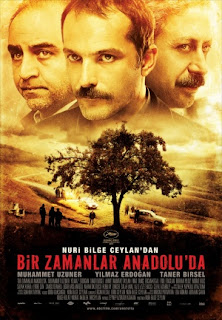Once Upon a Time in Anatolia
Once Upon a Time in Anatolia is a Turkish film from 2011 by Nuri Bilge Ceylan. It's a contemplative (and at times boring) but often brilliant film concerning the search for a dead body.
The film has some stunning imagery, no more so that the first few minutes, when the lights of three vehicles are seen traversing the road in pitch dark. They are in the Anatolian steppe. At first we only see the cars from a great distance, and hear the dialogue, so we don't know exactly what's going on. Then the picture becomes clearer: it is policemen, a prosecutor, a doctor, gravediggers, and two men in handcuffs. The latter have confessed to a murder, and are trying to find the place they buried the body.
The banality of death is a major theme in this picture. When we finally see inside one of the sedans, policemen are engaging in idle chatter about yogurt. In the center of the back seat is a gaunt man, not participating. The camera zooms in on him. He is the murderer.
Perhaps two-thirds of the film is the search for the body. The arrested man was drunk, and he only remembers a few flimsy details, and one place in this desolate area looks pretty much like the other. The group settles into a village for the night, where the mayor implores the prosecutor that his village needs a new wall for the cemetery and a morgue. When the power goes out due to the wind, the prosecutor suggests perhaps the money be better spent on improving the power.
Finally the body is found, and we settle into a procedural about the transportation of the body back to town and the autopsy. The group has forgotten to bring a body bag, and they have no ambulance, so they must fold the body into the trunk of one of the sedans.
At times this plays as boring as it sounds, but mostly it's quite gripping. The various men have various conversations, most of which are about their roles as men--the police chief hardly ever sees his wife, and has a disabled son; the doctor has been recently divorced; and the prosecutor tells a story about a woman who predicted her own death, and it becomes apparent that he is talking about his own wife. The doctor will unintentionally give him information that will rock his world.
Some of the photography is just stunning, such as a moment at the village when the mayor's daughter wakes the men to serve them refreshments. She is beautiful, and they each regard her as some sort of vision. It's not really sexual--it's more like a visitation by an angel. One of the men comments that her beauty is wasted in this god-forsaken village, recalling the lines by Thomas Gray: "Full many a flower is born to blush unseen, And waste its sweetness on the desert air."
The film drags on a bit too long (over two and a half hours) but I recommend it; just be wide awake while watching.
The film has some stunning imagery, no more so that the first few minutes, when the lights of three vehicles are seen traversing the road in pitch dark. They are in the Anatolian steppe. At first we only see the cars from a great distance, and hear the dialogue, so we don't know exactly what's going on. Then the picture becomes clearer: it is policemen, a prosecutor, a doctor, gravediggers, and two men in handcuffs. The latter have confessed to a murder, and are trying to find the place they buried the body.
The banality of death is a major theme in this picture. When we finally see inside one of the sedans, policemen are engaging in idle chatter about yogurt. In the center of the back seat is a gaunt man, not participating. The camera zooms in on him. He is the murderer.
Perhaps two-thirds of the film is the search for the body. The arrested man was drunk, and he only remembers a few flimsy details, and one place in this desolate area looks pretty much like the other. The group settles into a village for the night, where the mayor implores the prosecutor that his village needs a new wall for the cemetery and a morgue. When the power goes out due to the wind, the prosecutor suggests perhaps the money be better spent on improving the power.
Finally the body is found, and we settle into a procedural about the transportation of the body back to town and the autopsy. The group has forgotten to bring a body bag, and they have no ambulance, so they must fold the body into the trunk of one of the sedans.
At times this plays as boring as it sounds, but mostly it's quite gripping. The various men have various conversations, most of which are about their roles as men--the police chief hardly ever sees his wife, and has a disabled son; the doctor has been recently divorced; and the prosecutor tells a story about a woman who predicted her own death, and it becomes apparent that he is talking about his own wife. The doctor will unintentionally give him information that will rock his world.
Some of the photography is just stunning, such as a moment at the village when the mayor's daughter wakes the men to serve them refreshments. She is beautiful, and they each regard her as some sort of vision. It's not really sexual--it's more like a visitation by an angel. One of the men comments that her beauty is wasted in this god-forsaken village, recalling the lines by Thomas Gray: "Full many a flower is born to blush unseen, And waste its sweetness on the desert air."
The film drags on a bit too long (over two and a half hours) but I recommend it; just be wide awake while watching.



Comments
Post a Comment